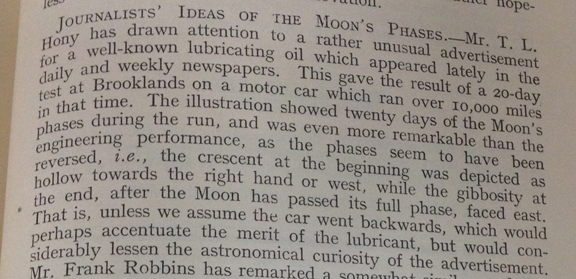I recently came across a funny little article called “Journalists’ Ideas of the Moon’s Phases” in the Oct. 1934 issue of the Journal of the British Astronomical Association. Looking through the index, I happened to glance at the title, and immediately I knew what this had to be. My snark radar was tingling, and I was right.
This article struck me because it’s so similar to the kinds of things I see today, all the time. I haven’t seen Gravity yet, for example, but I already know what’s wrong with it because Neil DeGrasse Tyson sent out a series of tweets pointing out errors in the science. Tyson is now notorious for calling out questionable science in movies and on TV, having pushed director James Cameron to fix up the night sky in Titanic, and having teased Jon Stewart for his retrograde-rotating Earth in the opening credits of The Daily Show. His argument is a simple one: it’s not hard to get the science right, so why not err on the side of caution and do your homework?
That’s exactly the argument that historian of science Thony Christie made against Tyson a few months ago when Tyson incorrectly tweeted that “the symbol ‘lb’ for pound comes from an abbreviation of the constellation Libra, the scales.” In fact, the symbol does come from the Latin word “libra,” but that word has two meanings. The relevant one is a Roman standard of weight, while the other meaning, “scales,” became the namesake of the constellation and has nothing to do with the abbreviation.
That might sound like nit-picking, but is it really all that different from pointing out that the Earth rotates backwards in the intro to a Comedy Central show? The plea is the same: it’s not hard to consult an authority1 on the subject, so why not do it?
In all of these cases, expertise and authority are at stake. Who gets to speak about certain topics, and in which circumstances and by whom are they believed? I think it’s understandable to be upset when a public figure misrepresents a fact about which you have some claim to expertise. When the BBC Science Club promotes a cute video about the history of physics that has very little actual history in it, or when internet science headlines sacrifice truth for sensationalism, or when a fake documentary on mermaids barely admits that it’s fake, or even when the phases of the moon are reversed in a 1934 motor oil ad, someone – a scientist, a historian, whoever – who could have contributed a nuanced, fact-checked perspective based on years of experience (and maybe helped to spread a little solid knowledge around) wasn’t consulted. That’s frustrating.
It’s also, probably, unavoidable. Whether it’s scientists vs. journalists, or historians of science vs. scientists or popular writers vs. academics, authority in a given subject will always be contested, and all of these parties have different goals in mind when they write or speak or film, etc.2 That doesn’t make it less annoying to hear shoddy history or flimsy science repeated online or in the media, but it does prompt me to think carefully about how to respond.
Call-outs and tear-downs are often satisfying, but sometimes I find the negativity to be overwhelming. I know it’s not easy (especially since nuanced pieces aren’t nearly as easy to share as blunt tell-you-what-to-think memes and myth-busting) but I’d take a thoughtful, upbeat, constructive teaching-moment approach over a snarky rebuttal any day. I’m probably being naive here, but if you don’t like what’s out there in the ether, why not add an alternative?
I know this is already a topic of discussion in the history of science blogosphere, and my own experience tells me that scientists and historians of science generally have very different attitudes toward each other. I’m told there are tensions between historians of science and historians in general too (and I expect I’ll encounter more of that in the future). Academic disciplinary tensions are one thing, though; the popular arena is quite another. It’s a big exciting internet out there, and it’s pretty easy to lend your voice to it, or at least to get started. Just keep in mind what kind of voice you want to add to the mix.


Maybe the maker of the ad was from the Southern hemisphere.
[…] close out my personal choice for blog post of the month, True Anomalies tackles the tangled web of Errors and Expertise in science and the history of […]